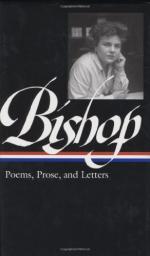|
This section contains 587 words (approx. 2 pages at 300 words per page) |

|
Reading [Bishop's] The Complete Poems, where scarcely a poem is without its sea and travel image—coast, harbor, map, road—one is not long deceived by the maps and travel books, the fish and seabirds. This poet's role is not Haklyut nor Audubon, but Magellan, Henry the Navigator, the spirit of Clark accepting Lewis's invitation: "This is an amence undertaking fraited with numerous difficulties" and characterized by an irresistible enthusiasm not for lands untrod by foot, but for places—knowledge—heretofore unreached by the imagination. The paraphernalia of the navigator-explorer comes to mean the conscious explorer-discoverer beyond the realm of ordinary experience, even the sympathetic prodigal with his "shuddering insights." The folly of experience for experience's sake is debated in "Questions of Travel." But is there experience beyond The Experience? Does not the prodigal really know more? (p. 44)
The explorer is willing to lose all—ship and life...
|
This section contains 587 words (approx. 2 pages at 300 words per page) |

|


